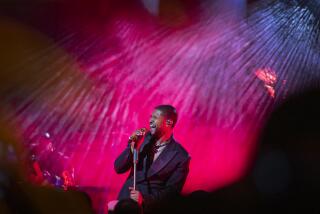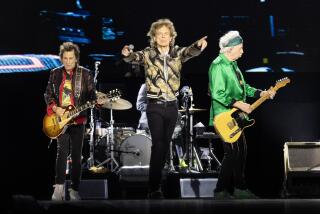That’s Their Ticket : Sprint-Stones Link Shows Corporate Sponsorship of Concerts
- Share via
Lew Menechino can’t believe he almost traded a chance at getting tickets to an upcoming Rolling Stones concert for a tub of ice cream.
Earlier this year, the 42-year-old Colorado resident almost switched his long-distance service from Sprint Corp. to a competitor that dangled a bag of goodies--including free Ben & Jerry’s ice cream.
So the longtime Stones fan breathed a sigh of relief when Sprint announced that its customers would get first crack at tickets for the Stones’ “Bridges to Babylon” tour that kicks off Sept. 23 at Soldier Field in Chicago.
“There’s no way I could have gotten these tickets without Sprint,” said Menechino, who had slept overnight in front of a ticket window in order to get tickets for the aging rock band’s 1981 tour.
Sprint, which paid a reported $4 million to the Stones, isn’t the only company hitching a ride on the rock sponsorship bandwagon. Best Buy Co. will tour this fall with Fleetwood Mac, and Fruit of the Loom is spending more than $6 million to produce a national tour featuring top country acts like Hank Williams Jr. and Travis Tritt.
The high-profile partnerships are designed to burnish a corporation’s image among free-spending consumers as well as to help them sell telephones, cars and beer.
“When a product or service becomes a commodity, the consumer has trouble differentiating between companies,” said Jim Andrews, vice president of Chicago-based IEG Sponsorship Report. “These kinds of events help a corporation stand out.”
Sprint’s name will be printed on Stones concert tickets and on a banner above the stage. But the true measure of success will be how many customers its advance-ticket offer draws from long-distance competitors.
Similarly, Best Buy hopes to polish its image by rubbing shoulders with the popular rock band. But the retail chain really wants to pull music-loving Mac fans into its 280 stores to buy more CDs and tapes.
Not every match is made in marketing heaven.
Several entertainment industry executives were stunned this past summer when Greenwich, Conn.-based UTS Inc. used a youth-oriented summer festival to pitch Skoal smokeless tobacco products.
And, in the quirky world of rock ‘n’ roll, a corporate sponsorship doesn’t always sit well with fans.
“What happens next time if they cut a deal with Ford?” asked Albuquerque resident John Franks IV, who is using his Web site to urge a Sprint boycott. “Will I have to buy an Explorer or a Mustang before I can buy a ticket?”
Sprint’s deal underscores that the band fronted by former London School of Economics student Mick Jagger typically gets what it wants from corporate sponsors.
*
The band signed an unprecedented deal in 1981 with perfume maker Jovan and subsequently partnered with Volkswagen and Anheuser-Busch, which reportedly paid about $6 million to sponsor the 1989 “Steel Wheels” tour.
More recently, Jagger and co-author Keith Richards sold Microsoft Corp. the rights to use “Start Me Up” as the soundtrack for the Windows 95 introduction--for a reported $12 million.
“In 1981, a lot of people were asking what the hell perfume had to do with rock,” said Gary Daugherty, executive director of Performance, a Fort Worth-based trade magazine. “Now most acts won’t go on tour without some kind of deal.”
Increasingly, what goes on inside the concert hall is just a small fraction of what a well-constructed sponsorship deal can deliver.
“Our main interest in all of the events we sponsor is the buildup to the actual event,” said Jan Soderstrom, an executive vice president of marketing for San Francisco-based Visa International, which has sponsored tours by Paul McCartney and Elton John.
“Even more important are the overlays and promotional spins you can create outside of the concert,” said Lee Heiman, a partner with New York-based Track Marketing, which has created corporate sponsorships for artists.
Successful sponsorship deals make an immediate connection with concert-goers, said Kevin Lyman, co-founder of the Vans “Warped Tour ‘97,” an alternative musical tour that’s owned in part by Creative Artists Agency.
Some sponsorship opportunities are best left untapped. Calvin Klein and Warped Tour executives quickly realized that the upscale clothing company was a poor fit for a tour that attracts teens who support alternative rockers.
Other deals are perfect fits.
Bailey Hats Co. has yet to hang its banner inside a concert hall. But a three-year affiliation with performer Clint Black proved to be a winner because the country singer--who regularly wore the Fort Worth-based company’s hats on stage--was a walking advertisement. “Clint helped us move into new territory among country music lovers,” said Bailey Vice President Chip Alexander.
Fruit of the Loom found country music’s demographics to be a perfect fit with its customer base, which led to the “Fruit of the Loom Country Comfort Tour.”
“When you see the Rolling Stones and Sprint, you wonder ‘Where’s the connection?’ But country music fans, our research consistently shows, are tremendous Fruit of the Loom purchasers,” said Dirk Herrman, Fruit of the Loom’s brand marketing vice president. “. . . These are our people.”
Sprint’s Stones affiliation borrows from affinity marketing programs honed by credit card companies that give away everything from concert tickets to airline miles, said Mike Kamins, a USC advertising professor.
Mike Goff, Sprint’s director of corporate sponsorships, acknowledges that long-distance providers are “beating the crap out of each other” with ads touting lower prices or better service.
“The beauty of the Stones is that they have a relevance to many of our customers’ lifestyles,” Goff said. “We’re now able to give them something special. We’re saying ‘We know what you want and we can give it to you.’ ”
Fans attending Fleetwood Mac’s October concerts at Irvine Meadows and the Hollywood Bowl will walk away with vouchers for a Fleetwood Mac CD-ROM, $50 in store coupons and compact discs featuring solo work by band members and other artists whose albums are on sale at Best Buy.
Corporate sponsors generally expect the benefits of a high-profile sponsorship to be three or four times what is being spent, Daugherty said, “so if the company is spending $3 million, they expect the final value to be worth $9 million or $10 million.”
*
Sprint, for example, will leverage its Stones investment by using band members’ pictures in commercials long after the group has left town.
For the sponsorship to work, Sprint will have to grab customers from competitors and hold onto them.
What’s unique about the Stones deal is that Sprint customers will be first in line for about half of the seats to be sold during the 32-city tour that culminates next February in Mexico City.
“It’s all about building business,” Goff said. “And we think the beauty of the Rolling Stones ticket promotion is that we’ll be able to track it in a quantifiable way.”
Industry statistics suggest that 30% to 40% of residential phone customers will switch long-distance services for a pint of Cherry Garcia or the opportunity to see Jagger strut his stuff during a Nov. 9 show at Dodger Stadium.
But Stuart R. Taylor, a Boston-based senior manager with Anderson Consulting, cautions that customers who can’t get satisfaction with Sprint “are just as likely to jump back next week.”
“It’s dubious that Sprint will generate customer loyalty with a one-shot deal like this,” he said.
Sprint executives acknowledge that some customers are switching their long-distance service to the Kansas City, Mo.-based company to score hard-to-get tickets and then sprinting right back to AT&T; Corp. or MCI Communications Corp.
And, while some fans are grumbling about the Stones’ commercial sellout, most seem to understand that the band is simply taking care of business--much the same way sports teams use someone else’s money to finance their events.
“Sprint having access to the tickets is far less intrusive and obnoxious than the constant calls I get from MCI asking me to switch,” said New York City resident Ira Stein, who used his Sprint card to buy tickets for the Stones’ Oct. 16 date at Giants Stadium.
(BEGIN TEXT OF INFOBOX / INFOGRAPHIC)
Jumpin’ Jack Cash
The Rolling Stones, which embark Tuesday on a 32-city North American tour, are a powerhouse wherever they play. The rock band was the top-grossing musical act around the world during the 1995 leg of its “Voodoo Lounge” tour. The top 10 gross ticket sales internationally that year were:
*--*
Group Gross Location (number of shows) Dates 1. The Stones $27.6 million Tokyo (7) March 6-17 2. The Stones 19.8 million Buenos Aires (5) Feb. 9-16 3. The Stones 11.8 million Mexico City (4) Jan. 14-20 4. The Stones 8.7 million London (3) June 11-16 5. The Stones 8.6 million Paris (2) June 30-July 1 6. The Stones 6.2 million Belgium (2) June 24-25 7. The Stones 5.9 million Australia (2) March 27-28 8. The Stones 5.6 million Switzerland (2) July 29-30 9. The Stones 5.2 million Australia (2) April 1-2 10. The Stones 5.2 million Netherlands (2) June 13-14
*--*
Note: All shows were sellouts.
Source: Amusement Business magazine
Rock of Aged
Only a handful of rock bands have the drawing power to mount national tours that can fill the country’s largest concert venues. Last year, aging rockers such as the Eagles and Kiss revved up their engines and dominated the concert season. The Rolling Stones didn’t tour in 1996.
Top 10 Touring Acts of 1996
Ranked by gross ticket sales
*--*
Shows Act Gross Attendance (sellouts) 1. Eagles $60.3 million 1,061,321 45 (45) 2. Kiss 36.6 million 1,011,701 76 (57) 3. Garth Brooks 33.6 million 1,843,328 115 (115) 4. Bob Seger 26.3 million 923,829 64 (46) 5. Neil Diamond 25.6 million 847,655 50 (31) 6. Rod Stewart 23.0 million 599,496 52 (12) 7. Reba McEntire 21.5 million 835,042 62 (33) 8. Alanis Morissette 19.5 million 873,855 82 (70) 9. Jimmy Buffett 18.4 million 621,306 30 (23) 10. Ozzy Osbourne 17.6 million 767,916 78 (23)
*--*
Source: Amusement Business magazine
More to Read
The biggest entertainment stories
Get our big stories about Hollywood, film, television, music, arts, culture and more right in your inbox as soon as they publish.
You may occasionally receive promotional content from the Los Angeles Times.










